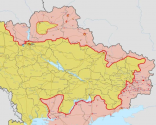Very interesting how history turned out. OUN originally grew out of Ukrainian resistance movements to Polish rule in the parts of Western Ukraine that had been anexxed by Poland. It was the German invasion of Ukraine that enabled the movement to spread into the rest of Ukraine and transformed into a broader Ukrainian independence movement. Eventually the Nazis, with whom the OUN initially collaborated, turned on the OUN and the organization had to eventually fight Germans, Soviets, as well as Poles for the remainder of WW2. Unfortunately, the organization got involved with a genocide of ethnic Poles living in the border regions of Ukraine and Poland to which the Nazis turned a blind eye. So for most of its history, the OUN was not an organization of freedom fighters to Soviet rule. Yet today, their common hate (arguably justified) towards Russia has drawn Poles and Ukrainians together.
The Poles, Russians, and Ukrainians have a deep history of conflicts with one another.
Western media now ignores or downplays the long bitter conflicts between the Poles and Ukrainians.
Interwar Poland (1919-1939) is greatly idealized by Polish nationalists. But even Norman Davies (a British historian
who's a fanatical supporter of Polish nationalism) has conceded that Poland 'brutally pacified' its Ukrainian minority.
When Germany (and Slovakia) invaded Poland in 1939, a unit of Ukrainians (exiled from Poland) marched with the
Germans in order to help 'liberate' Poland's Ukrainian minority. When Polish soldiers desperately attempted to flee
to friendly Romania, they often clashed with Ukrainian communities along the way. There are accounts of Polish
stragglers being waylaid and killed by Ukrainians, and vengeful Polish soldiers then massacring Ukrainian villages.
I read a story where Polish soldiers came across a Polish cavalry officer who apparently had been killed by being tied
to two horses, which were then driven in opposite directions so his body was torn apart. The Poles then killed everyone
(including unarmed civilians) whom they could catch in the nearest ethnic Ukrainian village. That news spread quickly.
Retreating toward Romania, Polish soldiers then came across 'empty' ethnic Ukrainian villages because everyone had fled
into hiding, fearing the soldiers of their own country as much as they would fear any foreign invader.
Ukrainian nationalism may be traced back to the Khmelnytsky Uprising (1648-57) against the Polish-Lithuanian Commonwealth.
"The uprising has a symbolic meaning in the history of
's relationship with Poland and
. It ended the Polish Catholic
′s domination over the
population; at the same time, it led to the eventual incorporation of
into the
initiated by the 1654
, whereby the Cossacks would swear allegiance
to the
while retaining a wide autonomy."
--Wikipedia
The novel _Taras Bulba_ by Gogol describes the passionate hate between the Orthodox Cossacks and the Catholic Poles.
"For several years after the
ended, the Ukrainian Nationalist insurgency, led mainly by the
, continued fighting in the South-East of
. This war, largely supported by the local Ukrainian part of the
population, continued until 1949, with some sporadic fights taking place as late as 1956."
--Wikipedia
In 1947, Poland (with Soviet approval) conducted 'ethnic cleansing' of its Ukrainian minority in order to deprive the
Ukrainian nationalist guerrilla army of its base of sympathizers and potential recruits.
"In 2007 the presidents of Poland (
) and Ukraine (
) condemned the operation as a
violation of
."
Polish, Russian, and Ukrainian nationalists like to claim that their own people always behaved like angels but were
cruelly wronged by the other two peoples. In reality, wrongdoing was broadly distributed among all three peoples.

